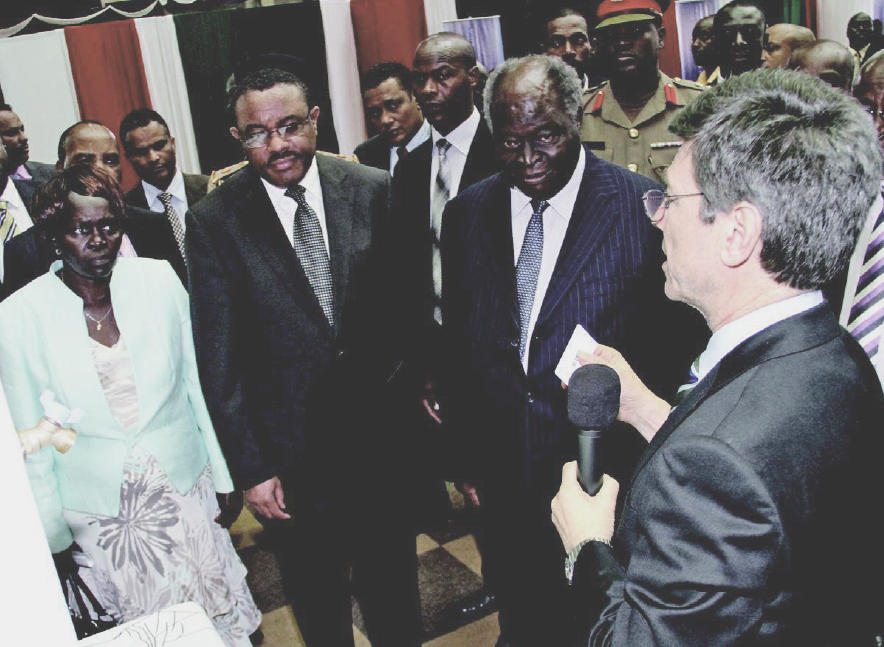“Almost fifty years ago, when Kenya gained independence, the founding father of our nation, the late Mzee Jomo Kenyatta, declared that the greatest challenges that the new Kenya faced were poverty, disease, and ignorance.”
Mwai Kibaki, the president of Kenya, spoke at the opening of the Columbia Global Center in Nairobi on January 14. He said the new center, by promoting academic collaborations between Columbia scholars and their Kenyan counterparts, will help his country achieve its own ambitious development goals, which include making Kenya a middle-income country by 2030.
Columbia President Lee C. Bollinger said the benefits will be mutual: “Each opening of a Columbia Global Center holds great promise, not only for new academic partnerships in the host nation and region but also for the continuing reinvention of Columbia’s home campuses in New York City, where our scholarly mission demands a global presence.”
The Global Center in Nairobi now belongs to a network of eight overseas academic hubs that the University has established since 2009; the latest, in Rio de Janeiro, was publicly inaugurated in March. Other centers are based in Amman, Beijing, Istanbul, Mumbai, Paris, and Santiago.
“The driving principle of the Columbia Global Centers always has been to foster academic collaboration across national boundaries, discover new knowledge, and address challenges facing our society by connecting students and faculty on our home campuses in New York City to partners around the world,” said Bollinger at the opening of the Rio center on March 18.
The centers are set up in countries where Columbia already has a strong presence in the hopes of building on that momentum.
In Kenya, for example, many Columbia economists, agriculture specialists, engineers, hydrologists, and health researchers lead sustainable-development projects. Some are affiliated with a program organized by the United Nations and Columbia’s Earth Institute for eradicating rural poverty in Africa, the Millennium Villages Project, that has a regional outpost in Nairobi. The outpost is run by Belay Begashaw, a Columbia development expert and former Ethiopian agriculture minister who is now also serving as director of the Global Center in Nairobi. His professional network and his facilities are thus available to any Columbia faculty and students wishing to work in the region.
Ideas for new projects will come from conversations that Columbia faculty have with African scholars. “We have no preconceived notions and don’t pretend to have answers,” said Safwan M. Masri, Columbia’s vice president for Global Centers. “We’re here to learn from you.”
The Global Center in Rio de Janeiro, inaugurated with a series of panel discussions and special events attended by Bollinger, Provost John Coatsworth, and several deans from March 18 to 20, occupies 2,500 square feet of office space in the city’s commercial center. It is directed by Thomas Trebat, a Columbia expert on Latin American economics who has lived and worked in Rio.
The center is exploring possible collaborations with Studio-X, an experimental design studio that Columbia’s Graduate School of Architecture, Planning, and Preservation operates in Rio. The center also plans to facilitate Brazilian projects for Columbia Law School, Columbia Business School, Columbia University Medical Center, and the School of International and Public Affairs. Columbia’s School of the Arts is looking to launch film projects in Brazil, and the Global Scholars Program also seeks a Brazilian component.
“From almost any perspective — economic, political, social, cultural — Brazil exudes vibrancy and growth and has enormous contributions to make to the global community of nations,” Trebat says. “With its national focus now turned squarely toward improving education for all its citizens, and expanding knowledge in all fields, Brazil and its iconic city of Rio de Janeiro are absolutely perfect hosts for this, the newest Columbia Global Center.”



